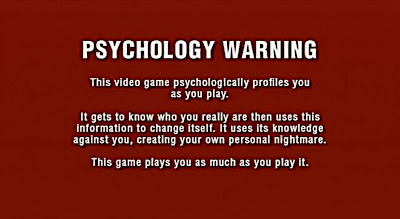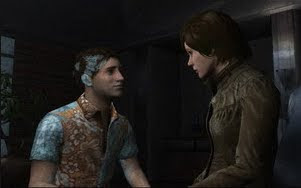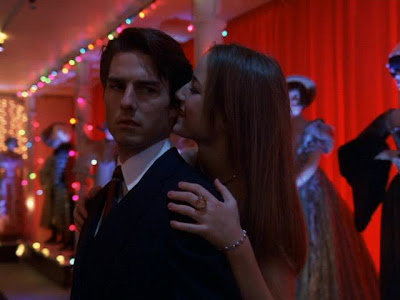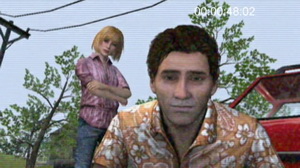This post originally appeared on Matt Weise's blog Outside Your Heaven and contains spoilers for Silent Hill 1, 2, and Shattered Memories.
I just finished my second play-through of Silent Hill Shattered Memories, studio Climax's remake of Silent Hill 1. As much as I dislike the developer's pretentious claims about their game "playing you as much as you play it" I have to admit it wasn't too bad. After their mediocre Silent Hill: Origins I had Climax pegged as a bunch of Silent Hill 2 fanboys whose idea of "improving" Silent Hill 1 was to turn it into Silent Hill 2, i.e. to make it about the psychology of a sexually troubled protagonist. Sure enough Shattered Memories does this, but in a more original and thoughtful way than I expected.
The idea of Silent Hill becoming the "personal nightmare" of people who have past traumas connected with it was actually invented in Silent Hill 2, not 1, and since everyone seems to agree that Silent Hill 2 is the masterpiece of the series its "formula" has become highly fetishized, especially by Western gamers. What people forget, though, is that the "it's your nightmare!" twist of Silent Hill 2 was originally surprising because it was someone else's nightmare in Silent Hill 1. It was the nightmare of a girl named Alessa, a poltergeist who had been horrifically abused by her mother and whose latent psychic power had exploded in adolescence and transformed Silent Hill into a living manifestation of her pain.
Harry's search for his daughter Cheryl (whom you eventually discover is a phantom projection of Alessa) in Silent Hill 1 wasn't about him at all. It was about him baring witness to Alessa's anguish, and Alessa was in a sense the real main character. Virtually every screen was symbolic of some horrible thing that had happened to her, making her interior psychology the literal subject of the player's exploration. Silent Hill 2 revised this slightly. It suggested the town itself had a quality that caused reality to take the shape of people's trauma, which was necessary to explain why you were in a nightmare other than Alessa's. This revised explanation defined the Silent Hill mythos from then on--which is fine because it was quite good--but a downside is that a lot of people seem to have forgotten that Silent Hill 1 was just as "personal"... and in some ways more tragic and harrowing.
The guilt James suffers from murdering his wife in Silent Hill 2, for me at least, does not compare to what Alessa went through. She was abused by her religious fanatic mother, burnt to a featureless husk, and then imprisoned in a hospital basement for nearly a decade, tied to a wheelchair, in a straight-jacket, with nothing to do but lose her agonized mind. Alessa's trauma might have been less everyday than James', but it hardly seemed unreal to me. On the contrary it seemed to be the sort of unthinkable fate we don't allow ourselves to imagine most of the time, because it would shake the foundations of our belief in civilization... that humans are more than just animals.
Alessa in Silent Hill 1 was for me an Ann Frank-like figure, a case study in what happens when the sickest shit human beings are capable of collides with the everyday trivialities of growing up. The astonishing contrast of Silent Hill 1's imagery--an elementary school that turns into an Auschwitz-style prison, dolls and children's toys scattered about rusty syringes and barbed wire, endless bodies in straight-jackets trapped in cages--touched on something unspeakable. They never talk about it in school, but as a kid it's hard to read Ann Frank's diary and not imagine what it was like when people like her died in death camps. The world you explore in Silent Hill 1, to me, is very close to what I imagine the wrecked mind of a young Holocaust victim would look like if it were captured in their final, tormented moment.
Shattered Memories, somewhat smartly, doesn't try to address the same set of ideas. It isn't about horrific abuse. It isn't about disfiguring burns, imprisonment, wheelchairs, straight-jackets, or rusty metal. It is, though, still about the interior traumatic mindspace of a teenage girl, and the vehicle used to explore it is still her father. You still play as Harry looking for Cheryl in a snow-swept Silent Hill, and the world still oscillates between reality and a nightmare version of itself. But the nightmare imagery is different (snow and ice, not rusty medical torture) and appears--at least initially--to represent Harry's mind, not Alessa/Cheryl's.
The impression that you are in Harry's nightmare stems largely from first-person "therapist" scenes. Periodically the story stops and a sleazy therapist appears, urging the player to do little "exercises" before continuing. They range from answering questions about sex and family to taking Rorschach tests and drawing pictures. What they are supposed to do is "tailor" the nightmare imagery and narrative to reflect your--meaning the player's--psychology. Since Harry is the player's avatar, all this manifests in-game as if your sexual, social, family issues were Harry's. If you tell the therapist you sleep around, all the women around Harry dress sexier, seem more seductive, and in the nightmare world disfigured naked women chase you. However...
...in the ending you discover you're not in Harry's mind at all. You're in Cheryl's. The game ends when you finally reach the mental health clinic, thinking you'll find Cheryl. You run down the hallway, burst into the room, and you're in the therapy room you've been seeing the whole game. The camera finally cuts--for the first time--to a reverse shot of who the therapist is speaking to. It's Cheryl. Harry, you discover, died in a car crash years ago, and the whole game has been a waking dream Cheryl's been describing to her therapist.
This ending is unexpectedly touching. The therapist explains Cheryl has constructed a heroic fantasy of her father trying to "find" her, because she felt so abandoned after he died. He postulates that she blames her mother for her father's death (since he left because of a divorce) and that as a result has developed an honest-to-god Electra complex--seeking out surrogate "fathers" in all her sexual relationships with other men and seeing all competing women as surrogates for her mother. This is actually foreshadowed throughout the game, with Harry being constantly seduced by a teenage, slutty version of Cheryl's mother Dahlia, and through rumors of a nameless teenage girl (obviously Cheryl) who is ridiculed for pursuing older men.
In the first ending I got (just one of several) Cheryl stares at the phantom father, the idealized male of her subconscious, and says goodbye to him. In that moment he crystallizes into a statue of ice, a rather horrific event you've seen happen throughout the game to other people, much to Harry's astonishment. To see it happen to Harry himself--you--is pretty striking. You're already reeling from the shock that you're not Harry but Cheryl, and the wave of melancholy she feels at saying goodbye to her father feels like an echo of you saying goodbye to your avatar. It's "letting go" of a phantom surrogate, a decoupling of yourself from a fantasy construct you have affection for but know isn't real.
This twist is in a lot of ways a very good one. It feels dramatic, satisfying, surprising, and functions nicely as a metaphor for the player's relationship with the game (Harry is, after all, Cheryl's "avatar" too). Where it perhaps falters is in its implied mechanics of human psychology. The twist that you're not in Harry's mind but Cheryl's is clever, but it also requires you to believe that the psycho-sexual dreamscape of a middle-aged man is interchangeable with that of a young woman. If the game "creates your own personal nightmare" based on how you answer the therapy questions, doesn't that diminish it as an expression of Cheryl's personal nightmare? Is Cheryl just an empty vessel for the player? She doesn't seem to be, since there are lots of hints in the game as to specific things which happened to her and specific traumas she has, so whose mind is it?
The obvious answer is both, but I wonder if the developers at Climax have a subtle enough view of sex and gender to give such duality proper breathing room. If I'm a man who "tailors" my dreamscape to involve a lot of extremely male-driven sexual anxieties, what does it mean that I'm revealed to be a woman in the ending? Is that what women are afraid of? Skimpily dressed cops and naked booby monsters?
I suppose you could argue that Cheryl isn't directly afraid of those things herself, but that she imagines (rightly or wrongly) that those are the sorts of things that might distract her father away from her. There is possibly some credence to this, especially if you view the story as a series of seductions--some literal, some figurative--that Harry/the player narrowly escapes... rather like what Tom Cruise's character goes through in Eyes Wide Shut. I wonder, though, how absurd Kubrick's film would have seemed if in the end you discovered Tom Cruise was just a figment of Nicole Kidman's imagination? Would anyone have believed his fantasies were in reality the product of her subconscious?
The somewhat cavalier view Shattered Memories takes to dream logic is arguably the result of its "adaptive" narrative system, in which dream images and symbols are interchangeable based on the player's choices. I am not convinced this system helps the game. One reason Silent Hill 1 and 2 endure as artworks is because they have consistent, meticulously designed dreamscapes worth studying and interpreting over multiple play-throughs. Shattered Memories may be trying to do too much by wanting to create a similar experience that dynamically changes. The big "innovation" of Shattered Memories seems to be that the nightmare is the player's nightmare, but it possibly makes a fatal mistake by assuming it can be the player's nightmare and someone else's nightmare at the same time. As an experiment in interactive narrative it's interesting, but as a portrait of a fictional character it may have been stronger had it been entirely static.
My second ending wasn't as satisfying as my first. Cheryl seemed more bitter than bittersweet about her father, watching stoically as he turned to ice. Afterwards there was a clip of a sex video Harry apparently made with Michelle and Lisa (two characters encountered earlier in the game) which assumedly Cheryl saw at some point. This explains their presence in her dream as "seduction obstacles", and may also explain the "TV static" motif of the interface at times. There are many other examples of videos too, and Kauffman (the therapist) suggests that Cheryl watches home videos obsessively. In any case, my new answers to the therapy questions apparently turned Harry into a womanizer and an adulterer, which made Cheryl resent him. Oddly Kauffman still talks about her "idolizing" him, inventing a fantasy where he is coming to save her.
In my first ending instead of the sex video I got a video of Harry leaving and Cheryl being sad. Not only do I like the ending a lot more emotionally, it also frankly seems to make a lot more sense. Choosing more sexual and/or cynical answers seems to make the story reflect this in a rather literal fashion. In my first game Cheryl seemed like a nice, if a bit introverted, girl who idolized her father in ways that (unconsciously) lead her into unheathly relationships with men, which made her bitter-sweet "letting go" of her father sort of touching. In my second game Cheryl seemed to be a slut and a criminal whose "positive" fantasy of her father was less easy to explain.
I don't mind the choices you make changing things, but one thing I had (incorrectly) assumed is that the player's choices simply change how Cheryl's psychology is expressed, not what Cheryl's psychology is. Playing again therefore isn't even exploring the same mindscape, but a different mindscape... which is sort of interesting... except that this requires the "meanings" of the dream imagery to be so interchangeable they fail to feel as subtle or as purposeful as those in the original Silent Hill games. The genre swap of the ending "twist" is a variation on this problem, and is further complicated by the fact that the player may be male or female, in which case it would be possible for the game to be the nightmare of a woman (the player), role-playing a man (Harry), who is secretly a figment of a woman's imagination (Cheryl).
The paint-by-numbers dream logic and dime store Freudianism Climax adopts in order to make their adaptive narrative workable does not seem able to embody such complexity, at least not to me, yet it's unclear whether Climax themselves are silly enough to believe they do. The beginning "psychology warning" feels tongue-in-cheek, but on the other hand the story clearly wants to be taken seriously as a psychological thriller. This leads me to believe the writers and designers of this game actually expect the player to take some of their more absurd constructions--like Kauffman--seriously, as if he weren't obviously an awful therapist and a fucking asshole and a maniac. He leers at you the whole game, makes constant sarcastic comments, and blows his top at the end, smashing his wineglass and screaming in a fit of rage over Cheryl's inability to "get over" her fantasy. This sort of ludicrous Hollywood crap makes you think no one at Climax has ever even talked to someone who's been to therapy, let alone gone themselves.
Overall I found Shattered Memories pretty interesting, in spite of its over-reaching pretension and occasional bad writing. I really liked the first ending I got, which seemed to quite cleverly pay homage to Silent Hill 1 (it's all about Cheryl) while simultaneously paying homage to Silent Hill 2 (it's all about the protagonist), while still maintaining some of the pathos associated with the series' best moments. Maybe one of the reasons the ending affected me is because I still have this lingering sympathy for Alessa as a character, and I like the idea of her overcoming her past in order to live a normal life. Silent Hill 3 sort of dealt with this idea, as a direct sequel to Silent Hill 1 in which Alessa is reincarnated as a girl named Heather and given the opportunity to take revenge on the cult that abused her.
Shattered Memories feels more touching to me though, especially when read against Silent Hill 1. I like the idea that life can still be scary and difficult even if you were never the victim of horrific torture. Cheryl in Shattered Memories doesn't know how lucky she is, to have her skin, all her limbs, to be able to walk, to run, to speak. But that doesn't make her happy... anymore than it makes the rest of us happy who take such things for granted.


















